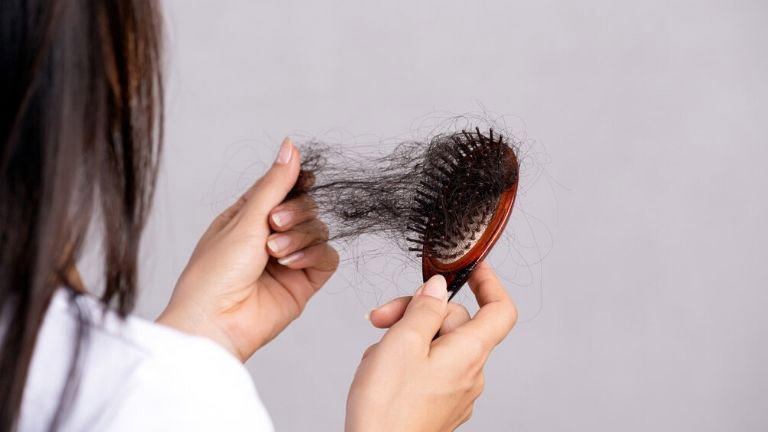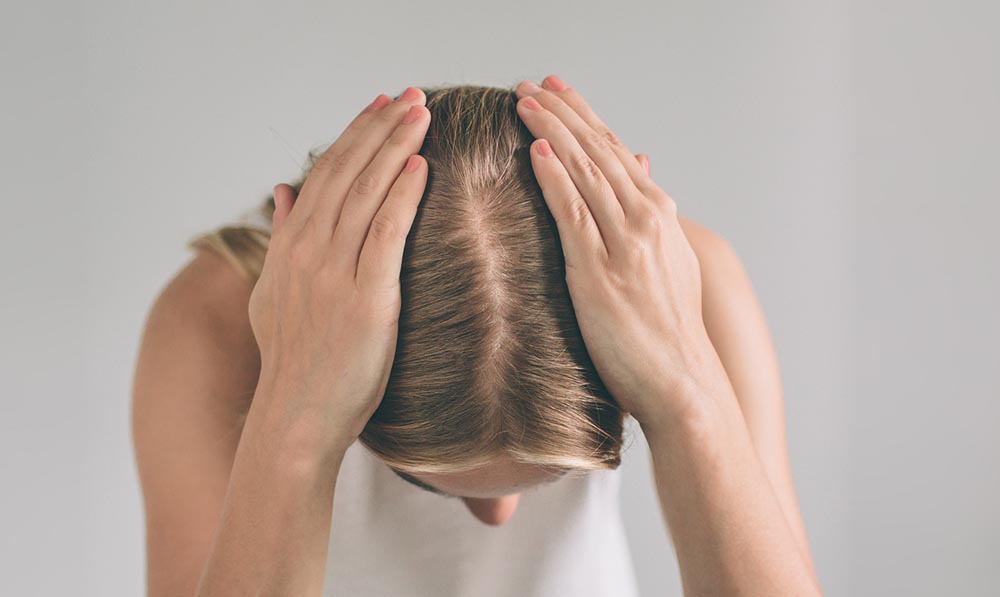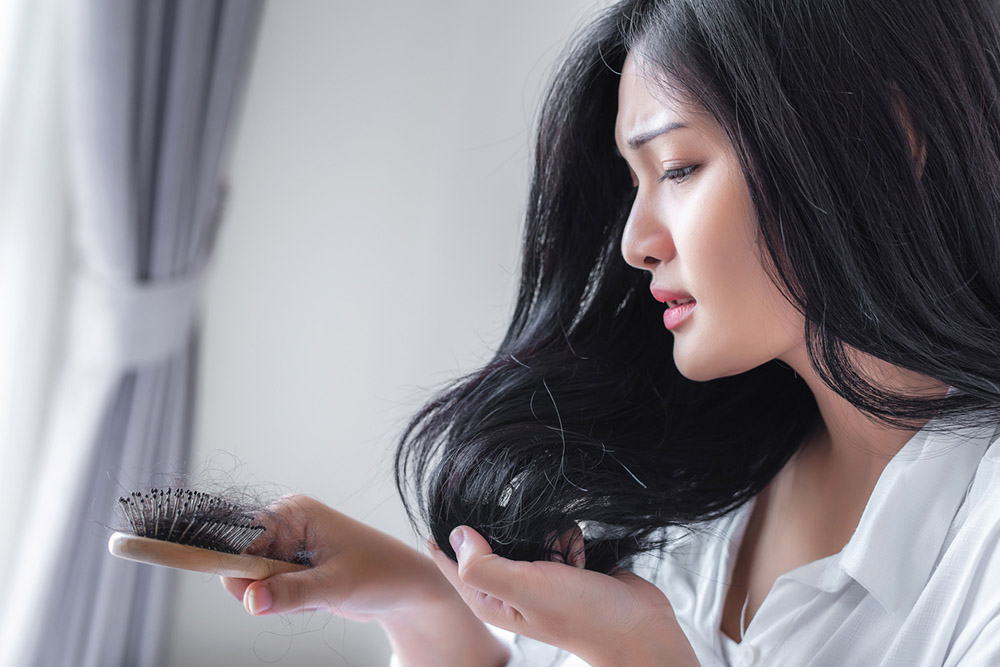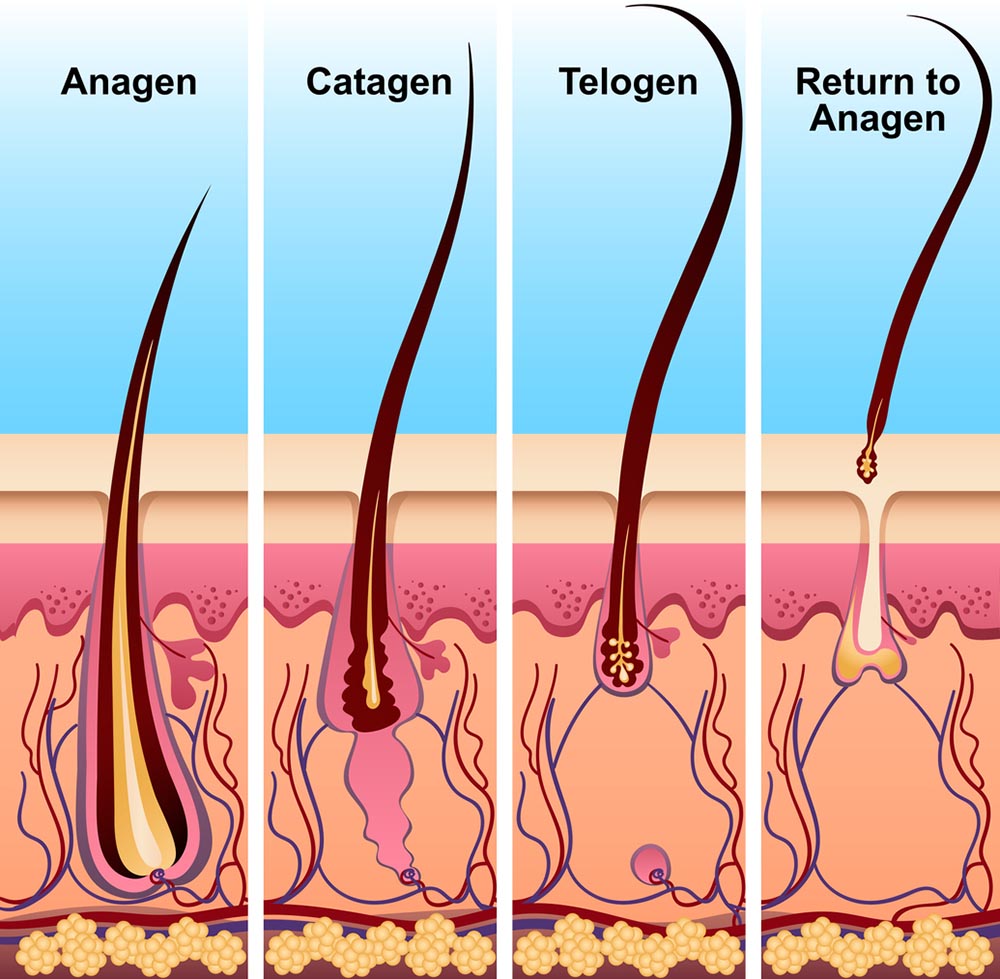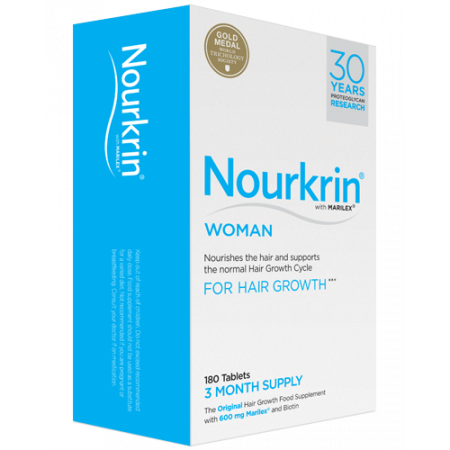Alopecia remains a taboo subject, yet hair loss products are a multi-billion pound business and are labelled to fix the impossible. Dr Omar is here to debunk five hair loss myths and stop you from wasting money on the lies
It is completely normal to lose a certain amount of hair (usually between 100 – 150 a day).
But when your hair starts to fall out in clumps or looks a lot thinner than usual, distress and worry start to kick in, which can make your hair loss situation even worse.
If you have experienced hair thinning or hair loss, you aren’t the only one.
An estimated 8 million women in the UK experience some degree of hair loss or hair thinning at any given time.
For so many of us, hair is a defining feature that provides you with character and confidence. It’s no wonder then that 46 per cent of women who experience hair loss suffer in silence, feeling too insecure or embarrassed to talk about their symptoms, which is why it remains a taboo subject.
However, according to newly published clinical research, Proteoglycan Replacement Therapy, using Nourkrin with Marilex promotes hair growth and hair quality with remarkably positive outcomes in several clinical trials.
This new published clinical paper is based on an outcome study where women with hair loss voluntarily started a six month course of treatment with Nourkrin Woman (600 mg Marilex per day).
By the midpoint of three months, the participants reported significant results and overall satisfaction with their hair growth recovery and appearance.
After six months, treatment satisfaction with Nourkrin Woman increased further as 96.49 per cent of participants reported improvement in their hair growth. What’s more, 97.37 per cent reported improvement in their hair appearance and quality.
The paper concludes that ‘the overall treatment satisfaction with Nourkrin has been markedly high in this study’. Based on the fact that 98.25 per cent of women with hair loss expressed their overall satisfaction with Proteoglycan Replacement Therapy with Nourkrin.
The fact that ‘no significant treatment related side effects were reported in this study’ further highlights the unparalleled safety and tolerability of Nourkrin Woman.
Signs your hair loss isn’t normal
Depending on what has caused your hair loss, it can appear in many different ways. It can come on suddenly or gradually and can affect your scalp to varying degrees.
Signs and symptoms of hair loss (also known as alopecia) include:
- Gradual thinning on top of head – the most common type of hair loss, affecting both men and women.
- Circular or patchy bald spots – Some people experience smooth, coin-sized bald spots or patchy hair loss (alopecia areata). This type of hair loss usually affects just the scalp, but can sometimes occur in beards or eyebrows. Your skin may become itchy or painful before the hair starts to fall out.
- Full Scalp hair loss – conditions and medical treatments, such as chemotherapy can result in the loss of all or most of the hair, which usually grows back after treatment and over time.
- Sudden hair loss – A physical or emotional shock, or stress can cause hair to shed in excess. Handfuls of hair may come out when brushing or washing your hair. This type of hair loss usually causes diffuse hair thinning rather than bald patches.
Your hair growth cycle explained
All types of hair loss, including alopecia, have one factor in common – a disrupted Hair Growth Cycle.
Your Hair Growth Cycle can be influenced by factors such as stress, medication, genetics, chemicals, poor nutrition, hormones, pregnancy, cholesterol, hair styling, diabetes, childbirth, extreme exercise and hypertension.
The realisation that your once healthy hair has started to thin or fall out can be a huge shock and send you on a desperate search for products to help.
Unfortunately though, too many hair growth products promise the world but don’t deliver.
As well as products, there are a few myths out there too surrounding hair loss such as ‘over-washing your hair will make it fall out’, ‘you need to eat loads of B vitamins’, ‘hair loss is for old people’ – do any of these sound familiar?
Hair loss expert and medical consultant for Nourkrin Dr Omar sets the record straight….
Myth #1 ‘Hair loss isn’t normal’
Hair loss is absolutely normal, in fact we lose between 100 and 150 strands of hair per day.
See, what most people don’t know is that your hair follicles have to go through three stages of the Hair Growth Cycle – and yes, one of these stages involves shedding hair.
Here are the three hair growth stages:
Stage 1 – The Growth phase, also known as the Anagen phase, is where 85 to 90 per cent of the hair on our head is actively growing. This phase can last for three to five years.
Stage 2 – The Transition phase, aka the Catagen phase, is when your hair has stopped growing and disconnects from the hair follicle. Approximately only one per cent of the hair on our head is found in this phase at any given time, which has a duration of only one to two weeks.
Stage 3 – The Resting phase called the Telogen phase is when around ten to fifteen per cent of the hair on our head sits inactive in the follicle after reaching its full growth potential. That means its just sat on your head, no longer growing nor falling out (yet) – it’s stays there for around three to four months before shedding.
Which takes us back to the Growth (Anagen) phase, where your hair will start to grow again.
When hair loss occurs, regardless of the cause or the type, the Hair Growth Cycle is almost always affected, resulting in a shorter growth phase and extended resting phase, which leads to increased shedding and weaker regrowth.
Treating this, and rebalancing the Hair Growth Cycle requires a specific treatment that helps to replace the ‘building blocks’ within our bodies. These are known as Proteoglycans, which help to regulate our hair growth.
Proteoglycans are biological molecules consisting of a core protein, present extensively throughout the body and as an essential part of the hair follicle.
‘Proteoglycans are one of the most common molecules throughout the human body. , A number of which have roles in hair growth regeneration, growth and cycling,’ explains Dr Omar.
‘Proteoglycans are naturally produced by the body, however, many health related factors such as cholesterol, diabetes and hormones can affect their production. These specific proteoglycans are not available in the food we eat.
‘The body’s inability to produce the proteoglycans necessary for healthy hair growth can cause a disruption to the normal Hair Growth Cycle, resulting in hair loss and thinning.
‘During a normal Hair Growth Cycle, proteoglycans play an important role in the normal cycling mechanism of the hair follicle,’ adds Dr Omar.
The proteoglycans modulate hair growth factors that control the induction and duration of the growth phase. A disruption to the normal Hair Growth Cycle can therefore result in hair loss and hair thinning, which can worsen over time if left untreated or unnoticed.
The disrupted Hair Growth Cycle is primarily caused by internal factors such as disease or diabetes or external factors such as stress. This will deplete the key proteoglycans found in and around the hair follicle and cause the hair to stop growing sooner than it used to.
Possible causes of a disrupted Hair Growth Cycle:
- Family history (heredity)
- Hormonal changes and medical conditions (menopause, thyroid problems, pregnancy, diabetes, lupus)
- Medications and supplements
- Radiation therapy to the head
- A very stressful event
- Certain tight hairstyles and treatments (pigtails, hot oil hair treatments)
- Extreme dietary restriction
Because of this, more hair strands will enter the Telogen (resting) phase earlier on in the cycle, leading to increased hair shedding and weaker regrowth.
A prolonged Telogen (resting) phase, means that fewer hair follicles are then being induced back into the Anagen (growth) phase again, which can result in no regrowth of hair.
If you’re experiencing too much hair loss or your hair is shedding excessively, you may have a disrupted Hair Growth Cycle and will need to consult your doctor or look into Proteoglycan Replacement Therapy.
Myth #2 ‘Your age matters’
Many people believe that hair loss and thinning hair is just for old people, but that isn’t entirely true. In most hair loss cases, clinical evidence demonstrates that age is not a predetermining factor.
‘Hair loss is no respecter of age,’ says Dr Omar. ‘It can affect young children, for a variety of reasons, and can affect women from the age of 20.
‘It has been reported that one in three women will notice hair thinning or hair loss after the age of 30. Another statistic shows that 60 per cent of all women will experience some degree of hair loss at some stage in their lives with an estimated 8 million experiencing hair loss at any one time’.
Many factors can cause hair loss, such as diabetes, or even thyroid problems – so it’s worth asking your GP to check for these if your hair is falling out. Sometimes hair loss can even be caused by external factors, with such as stress being one of the main contributors.
Alopecia areata is an autoimmune condition that causes hair to fall out suddenly. The immune system attacks the hair follicles. Hair from the scalp, as well as eyebrows and eyelashes, may fall out in small chunks.
36 year old Alopecia Areata sufferer, Lilja Reykjavik was diagnosed with Alopecia Areata in October 2017.
‘It started with a small area of hair loss and extended as shown in the pictures below,’ describes Lilja.
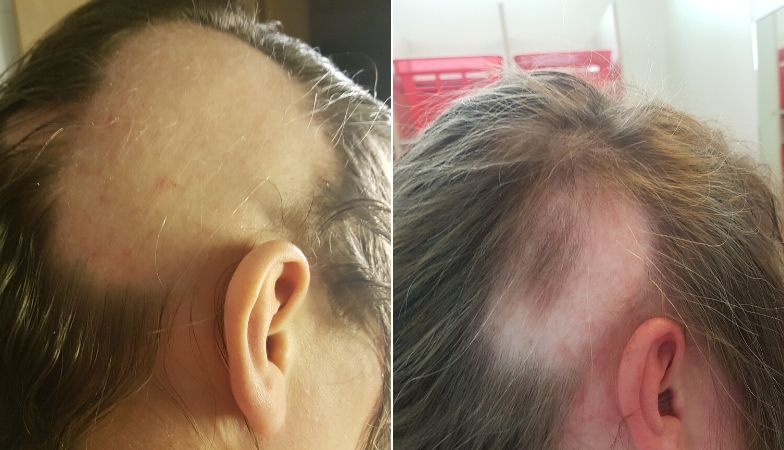
‘After seeing numerous specialists and trying a plethora of treatments including steriod cream, a skin specialist told me the hair root had ‘fallen asleep’ and advised it might take more than a year to grow again.
‘In frustration, I published my experience on Facebook. My cousin contacted me and I was introduced to Nourkrin’.
Clinically proven to induce hair follicles back into their growth phase, Marilex (a fish extract that provides a very unique and very specific combination of nutrients) is rich in key proteoglycans that are present in human hair follicles and are essential to hair follicle cycling.
Marilex interacts with specific growth factors that help influence and maintain a healthy Hair Growth Cycle.
‘The proteoglycans in Nourkrin have been extracted from fish, through a unique extraction process and provide a targeted supply of these essential nutrients to help re-balance the Hair Growth Cycle and stimulate existing hair growth,’ says Dr Omar. ‘This can take anything between three to 12 months with the minimum recommended treatment being a six month course’.
The results shown below took five months and her hair continues to improve.
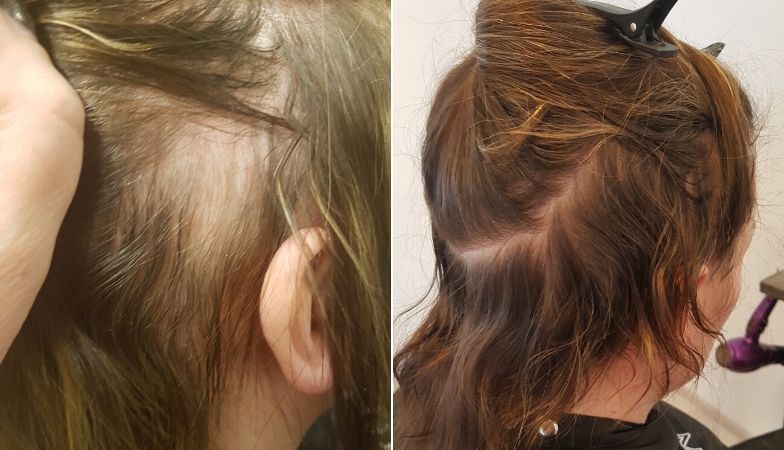
‘Finally, with the help of Nourkrin, my hair started to grow. It was the first time for a long time that I could have my hair loose and not in ponytail like always’.
So how does Nourkrin work?
With this treatment, hair follicles can be induced back into the Anagen growth phase by reintroducing specific proteoglycan growing phase components to the body through Proteoglycan Replacement Therapy.
Marilex acts to both induce Anagen growth in dormant follicles and, at the same time, prolong the Anagen phase in growing follicles. The follicles stuck in a dormant state are induced into the Anagen (growth) phase.
As more and more hairs re-enter the Anagen phase, the Telogen phase is pushed back to the normal level – reducing the amount of hair shedding.
Plus, the Anagen phase of existing follicles and hair strands is prolonged – promoting continuous healthy hair regrowth.
Nourkrin products are scientifically formulated to provide the correct nutrients required to normalise and maintain the Hair Growth Cycle, especially if there is an imbalance.
This proven hair growth supplement is supported by 30 years of research into hair growth disorders and is safe, effective and drug free.
Nourkrin Woman, £50.95, 60 tablets, take 2 tablets each day.
This supplement needs to be taken for a minimum of three to six months to have a visible affect.
Myth #3 ‘Vitamin B deficiency causes hair loss’
Although this is marginally true, this can still be classified as a myth – because the likelihood of this happening to you is extremely unlikely.
Research has shown you have to be significantly deficient in vitamin B to suffer from any hair loss. In fact, only two per cent of the female population in the UK suffer hair loss due to vitamin B deficiency.
‘Vitamin B deficiency is not a clinically important cause of hair loss. Although a severe deficiency in a number of other vitamins such as, niacin, vitamin D and biotin has been associated with hair loss, again this is extremely rare in most countries in the modern world,’ says Dr Omar.
Niacin deficiency currently only happens exclusively in very poor countries and in patients with malabsorption syndromes, alcohol-dependency or psychiatric disorders.
Also, there is no evidence that supplementation with vitamins or minerals where there is a deficiency may have any beneficial effects on the Hair Growth Cycle or clinical alopecia.
Indeed, many people will get plenty of B vitamins from their diets. Biotin (vitamin B7) is found abundantly in a long list of foods including meats, liver or kidney, egg yolk, nuts, such as almonds, peanuts, and walnuts, soybeans and other legumes, whole grains, bananas, cauliflower and mushrooms.
In Western populations, people typically receive 35 to 70 micrograms (mcg) a day of Biotin through their diet, while the daily required intake is 30-35 mcg a day.
That is why biotin deficiency rarely occurs in healthy individuals on a regular diet.
If you have a vegan diet however, keep in mind that many who follow a vegan diet have difficulty in getting enough vitamin B12. which is naturally found in animal products, including fish, meat, poultry, eggs, milk, and milk products.
Vitamin B12 deficiency can impact on hair quality and is needed ensure the health of hair cells and encourage new hair growth, therefore supplementation with B12 may be necessary.
Myth #4 ‘Over washing your hair causes hair loss’
‘People panic that over-washing their hair will remove essential oils or change the scalp environment but this is a total myth,’ reveals Dr Omar. ‘Most women will be fine washing their hair two to three times per week’.
Generally speaking, the thicker your hair, the less frequently you’ll need to wash it. But, if it’s summer, or you find yourself sweaty after exercise, feel free to wash your hair a bit more frequently – it won’t fall out.
Although over-washing your hair won’t cause hair loss, over styling with heated hair tools might, especially if your hair is already damaged due to weather or nutrition.
‘If you constantly use heated appliances on dry and damaged hair, it may turn brittle and fall out,’ warns Dr Omar.
The friction and stress put on dry or damaged hair could certainly weaken your hair to the point that it is more prone to breakage and falling out.
Other factors like everyday stress, or even the types of hairstyles you wear can also have an effect on hair loss.
Myth #5 ‘Hair loss treatments don’t work’
Well they do, if you choose the right one.
No matter your hair growth issue, achieving and maintaining normal growth requires supporting the hair growth cycle. Therefore, the goal of any working hair loss treatment, is to do just that.
‘A lot of people tend to focus on topical products,’ says Dr Omar. ‘This is where they apply it directly to the scalp. But what you have to do instead is treat the hair loss problem systemically, that means taking it orally into your digestive tract, absorbing the ingredients through your blood supply to the site of action which is the hair follicle itself.
‘Look for a supplement that contains biologically active molecules called proteoglycans, these are essential to how the hair grows. In my research the only product that I have seen that contains this is Nourkrin.
Nourkrin® with Marilex® is documented in several published clinical papers and is the only clinically proven Proteoglycan Replacement Therapy for hair loss on the market, plus it’s also the only hair growth supplement to be awarded the gold medal by leading experts at the World Trichology Society.
Relevant Healthista Content
Blake Lively reveals secret behind her glossy hair is COCONUT OIL
Got puffy eyes? Hair loss? These 7 vitamin deficiency signs could be ruining your looks
60 second smoothie for hair, skin and nails – tropical splash
Losing her hair and having asthma didn’t stop Joanna Rowsell bagging an Olympic medal
More Healthista Content
What’s sugar really doing to your mouth? The dentist’s guide
Blue Monday sorted – 5 proven ways to boost your mood through food
Is mindfulness the key to better sex?
The 30-minute eye lift that transformed this woman’s face
Like this article? Sign up to our newsletter to get more articles like this delivered straight to your inbox.



